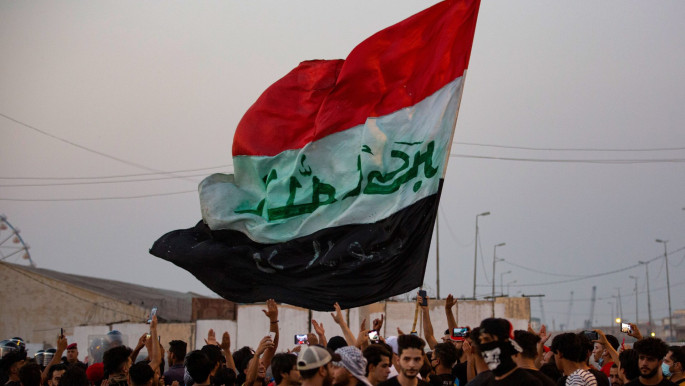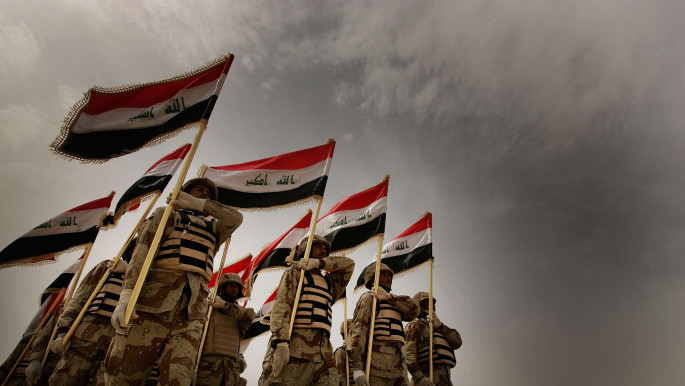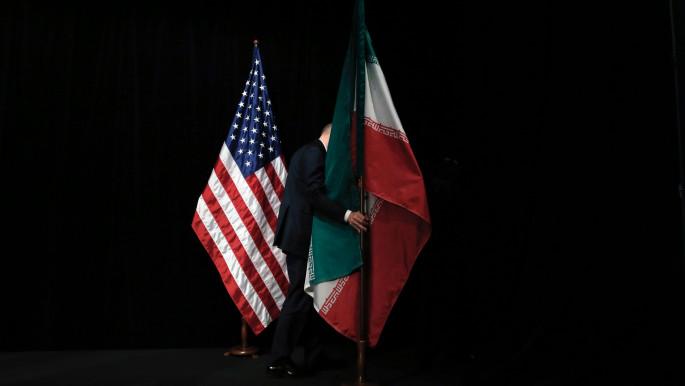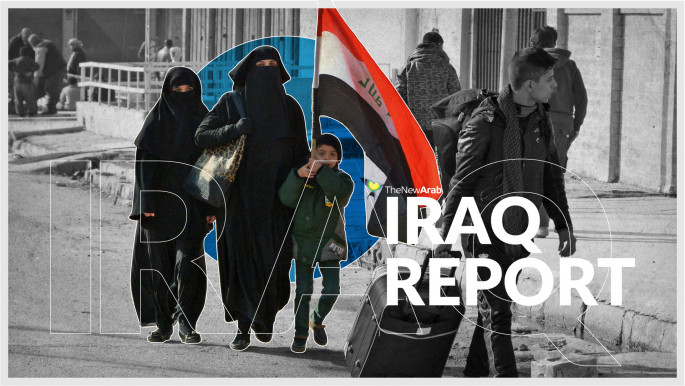The Iraq Report: Iraqis fear emboldened Iran-backed militias after Biden's election victory
With Joe Biden projected to be the next president of the United States, Iraqis who have been engaged in campaigning for greater rights against their Iran-backed government are now in fear that a return to Obama-era policies could harm their chances for freedom.
The United States already suffers from a trust deficit amongst the Iraqi people due to the perceived betrayal of actors up and down the country.
From the Kurds in the north, the Sunni Arabs whose peaceful demonstrations were crushed by the federal government in 2013, and now Shia Arab activists, who feel they may be abandoned by Washington as they stand up to Baghdad.
With an increased risk from pro-Iran factions also comes the risk that grievances will be exploited by other radical groups. Refugee camps for those displaced in the fight against the Islamic State (IS) group are now being emptied of their inhabitants, who have nowhere else to go.
This can only lead to increased internal strife, something Iraq has had an excess of since it was occupied by American forces in 2003 until the present day.
A Biden White House may endanger Iraqi human rights
While much of the world's media reported widespread jubilation at the impending departure of incumbent US President Donald Trump, Iraqis were more divided in their reactions.
 |
The United States already suffers from a trust deficit amongst the Iraqi people due to the perceived betrayal of actors up and down the country |  |
While those in official circles were generally in favour of a new administration under Joe Biden, civil society and activists met the news of a Trump departure with much trepidation and caution.
Iraqi factions supported by neighbouring powerhouse Iran are hoping a Biden presidency could roll back Trump's policies over the past almost four years, which included slapping sanctions on hardline Shia militants accused of human rights abuses and terrorism as well as bombing their bases.
"Trump's era was a very negative one, a period of demolition," said Mohammad Mohyi, spokesman for Kataib Hezbollah, a US-proscribed terrorist organisation and one of Iraq's most powerful outfits linked to Iran's Islamic Revolutionary Guard Corps (IRGC). "We hope the new administration will resolve this by ending the crisis and withdrawing its troops," he told AFP.
 |
|
| The Iraq Report: Kurd-on-Kurd violence as protesters clash with police |
Notably, Mohyi also attacked Trump over the "greatest crime" of having ordered the assassination by drone strike of IRGC Quds Force commander Qassem Soleimani and his Iraqi lieutenant and former commander of Kataib Hezbollah, Abu Mahdi al-Muhandis. Other Iran-sponsored Shia militants also hailed Biden's victory.
"Perhaps choosing someone who relies on a policy of coordination could pave the way for cooperation among countries," said Nasir al-Shammary, spokesman for Harakat Hezbollah al-Nujaba, further suggesting that Biden's reengagement with Iran would stabilise Iraq.
It is highly unlikely that Iran and its proxies in Iraq will seek to antagonise the United States, and it is likely that the frequency of attacks against American forces and interests will drop off radically if not completely in the coming months as Biden assumes the Oval Office.
Iran has a strong interest in the US rejoining the close-to-defunct Joint Comprehensive Plan of Action (JCPOA), better known as the Iran nuclear deal that was negotiated by the previous administration of Barack Obama when Biden was in office as vice president in 2015.
The US' re-entry into the nuclear deal could prompt significant sanctions relief against Iran which would in turn empower Tehran and will be seen as a victory for the so-called 'Axis of Resistance' – an Iran-led group of state and nonstate actors including Syria, Lebanon's Hezbollah, and the Gaza Strip's Hamas.
 |
While much of the world's media reported widespread jubilation at the impending departure of incumbent US President Donald Trump, Iraqis were more divided in their reactions |  |
While this may reduce violence against US forces in Iraq, it will likely increase violence perpetrated by these actors against the Iraqi people themselves.
Youssif, an activist who did not provide his full name for fear of reprisals, commented that the reaction of Iran's Shia axis in Iraq was a cause for concern.
"Those politicians, who called the US 'evil' and raised the phrase 'Death to America', congratulated Biden for winning the presidential election – as if an old friend had won," he told AFP.
This is likely in reference to Obama-era officials such as former presidential envoy to the anti-IS coalition, Brett McGurk. McGurk has been heavily criticised by both Iraqi and Syrian democracy activists for emboldening pro-Iranian sectarian Shia militias who have been repeatedly accused of perpetrating war crimes and crimes against humanity by Human Rights Watch and other rights watchdogs.
During the war against IS, and sanctioned by the Obama administration, the US provided close air support to many of these militias, who were classed as being part of the Iraqi security forces to provide justification for the American policy.
This overwhelming air superiority allowed them to not only fight IS, but to capture Sunni Arab cities and raze much of them to the ground while executing countless civilians without trial on spurious charges that they were IS militants or sympathisers.
 |
|
| Read more: What will a Biden presidency mean for Iraq? |
While much of the Sunni Arab political engagement with Baghdad has now effectively been repressed, pushing their politics underground, the current Shia Arab-led protest movement fears it will suffer a similar fate.
"Biden is worse than Trump. At least Trump made the Iranians and their servants [Iraqi Shia militants] scared," Hassan al-Kadhimi told The New Arab.
"We are now protesting against corruption and Iranian interference in our affairs. The militias are killing us. What will Biden do? He doesn't care."
Closure of refugee camps is a crisis in the making
With Shia political parties and militias increasingly using violence to quell a continuing protest movement that has been ongoing since October last year, there are now fears that Iraq's already disenfranchised and heavily persecuted Sunni Arabs could rise up against Baghdad once more.
The Norwegian Refugee Council (NRC) said it was "extremely concerned" about the fate of almost 100,000 internally displaced people (IDPs), most Sunni Arabs, who are imminently due to be made homeless after the Iraqi government decided to close down refugee camps.
This sudden homelessness will likely be exacerbated by bitter winter conditions and the coronavirus pandemic that has killed millions worldwide, with figures likely to be significantly underreported in Iraq due to a lack of proper medical facilities and surveying capabilities.
 |
Iraqi factions supported by neighbouring powerhouse Iran are hoping a Biden presidency could roll back Trump's policies over the past almost four years |  |
Tracking done by the International Organisation of Migration (IOM) showed that nearly half of the people forced to leave camps in Baghdad and the southern city of Karbala in recent weeks were unable to return home.
Iraqi authorities have claimed that it is time for these IDPs, who left their cities between 2014 and 2017 during the fighting against IS, to go back home.
However, most of the cities the IDPs abandoned to escape the brutal fighting have been razed by repeated airstrikes from the US-led anti-IS coalition, shelling from the Iraqi military, and intentional acts of destruction of civilian property by Shia militias fighting as part of the Popular Mobilisation Forces (PMF), an umbrella organisation of mostly pro-Iran militants.
Another issue faced by the refugees is the fact that many of them have been denied official documents by the authorities in Baghdad, effectively making them stateless without any rights other citizens enjoy, including being able to access the health and education systems.
 |
|
| Read more: Could Biden bring the US back into the Iran nuclear deal? |
They further face the risk of being arrested at checkpoints manned by security forces or, worse, Shia militias who often operate their own prisons outside of the jurisdiction of the justice ministry.
"Closing camps before residents are willing or able to return to their homes does little to end the displacement crisis," said NRC Secretary General Jan Egeland.
"On the contrary, it keeps scores of displaced Iraqis trapped in this viscous cycle of displacement, leaving them more vulnerable than ever, especially in the middle of a raging pandemic," she added.
But, according to some Sunni activists, this is precisely what the Shia-dominated and Iran-backed government in Baghdad hopes to achieve. Baghdad-based civil rights campaigner Omar, who cannot be identified for security reasons, blamed sectarianism for the crisis.
"They don't want Sunnis to have stability. No economic prosperity, no education, no health, not even the ability to vote in a so-called 'democracy'," Omar told The New Arab.
"To the regime, we are cockroaches. Sunni women and children were raped in refugee camps. Now they don't care if they die in the cold and the aim is to ensure Sunnis never have a voice ever again."
If this perception of abandonment and outright cynicism on the part of the Baghdad authorities continues to permeate throughout the Sunni Arab demographic, the federal government may find itself not only facing off against a Shia-led protest movement, but an outright revolt from the Sunnis.
These are circumstances that greatly resemble the rise of IS in 2014, and a failure to address the deep societal and political grievances felt by Iraqis of all stripes with a narrow focus on "security" by the incoming US administration could well mean that Iraq's history of violence will repeat itself anew.
The Iraq Report is a regular feature at The New Arab.
Click below to see the full archive
 |
|





 Follow the Middle East's top stories in English at The New Arab on Google News
Follow the Middle East's top stories in English at The New Arab on Google News


